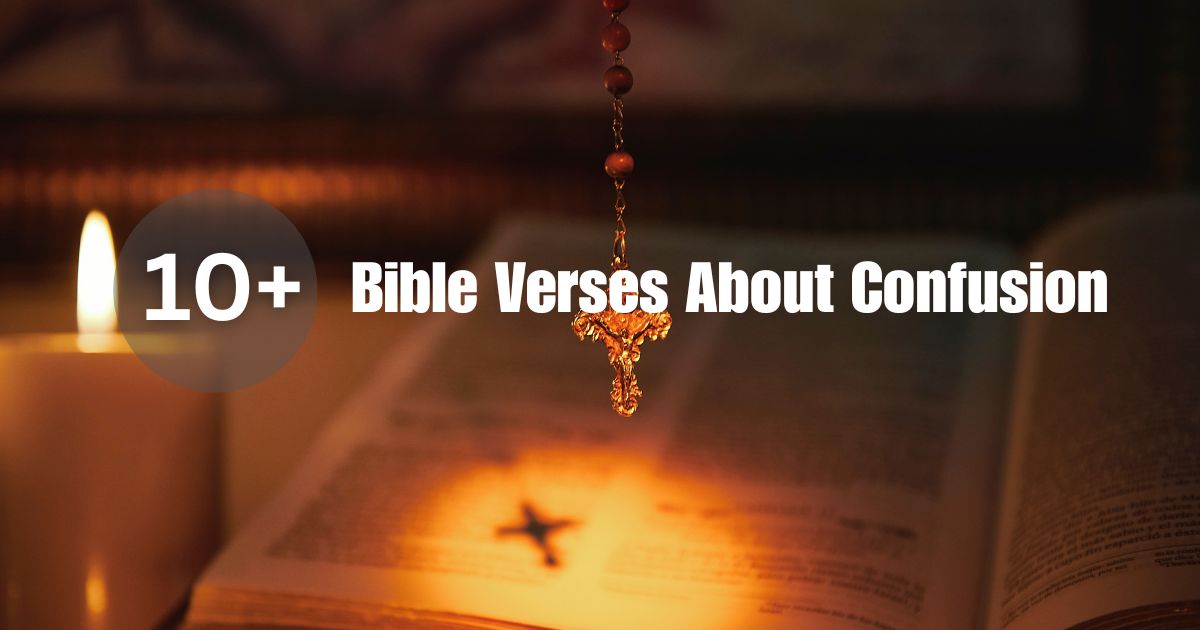Feeling confused is a universal human experience. Whether it’s confusion about a major life decision, a relationship, your career, or a world that often seems in turmoil, that sense of disorientation and mental fog can be incredibly stressful and isolating.
In these moments, it’s comforting to know that the Bible doesn’t ignore this feeling. Scripture directly addresses confusion, not just by naming it, but by offering a profound and practical path out of it. This article will explore key Bible verses about confusion, help you understand their context, and—most importantly—provide you with actionable steps to apply them to your life and find the clarity that God promises.
Understanding the Root of Confusion: Internal and External Sources
Before we look at the solutions, it’s helpful to understand what the Bible says about the sources of confusion. It doesn’t just happen in a vacuum.
- Internal Sources: Often, confusion springs from our own limited human perspective. Jeremiah 17:9 reminds us, “The heart is deceitful above all things and beyond cure. Who can understand it?” Our emotions and understanding can be flawed and easily clouded, leading us into uncertainty. Fear is another major internal driver, which is why God specifically gives us a spirit “of power, love, and self-control” (2 Timothy 1:7) to counteract it.
- External Sources: The Bible also points to spiritual forces that thrive on chaos. While God is not a God of disorder but of peace (1 Corinthians 14:33, NIV), the opposite is true of Satan, who is described as the father of lies (John 8:44) and the author of confusion. His goal is to deceive, divide, and disorient believers. Furthermore, the “wisdom of this world” (1 Corinthians 3:19) often contradicts God’s truth, creating a clash that can leave us feeling torn and confused.
Understanding this helps us see that confusion is not our permanent state; it’s a condition we can address with God’s truth.
What Does The Bible Say About Confusion?
The Bible is clear that confusion is not from God. The cornerstone verse on this topic, 1 Corinthians 14:33, declares, “For God is not the author of confusion but of peace, as in all the churches of the saints” This establishes a fundamental truth: while we may experience disorientation, its origin is not divine. Instead, Scripture often links confusion to other sources, such as our own limited human understanding (Jeremiah 17:9) or spiritual deception (1 John 4:1), contrasting it with the order and peace that characterize God’s nature.
Thankfully, God provides a clear path out of confusion. He invites us to seek His wisdom through prayer, promising to give it generously to those who ask (James 1:5). Furthermore, He has given us two essential tools for guidance: His Word, which is a “lamp to our feet” (Psalm 119:105), and the Holy Spirit, who “guides us into all truth” (John 16:13). The ultimate solution is to trust in God’s perfect understanding rather than our own, a act of faith that He promises to honor by directing our paths (Proverbs 3:5-6).
Core Bible Verses About Confusion
To help you navigate directly to what you need, these key verses have been grouped into powerful thematic categories.
God’s Nature is Peace, Not Confusion
This foundational category reminds us that disorder is antithetical to God’s character. He is the ultimate source of order and calm.
1. 1 Corinthians 14:33 (ESV)
For God is not the author of confusion but of peace, as in all the churches of the saints
- Context: The Apostle Paul wrote this to the church in Corinth, which was experiencing chaotic and disorderly worship services. People were speaking in tongues simultaneously without interpretation, creating bedlam rather than edification.
- Explanation: The Greek word for “confusion” (akatastasia) implies instability, tumult, and disorder. Paul uses the nature of God Himself as the ultimate argument for why their worship should be orderly and peaceful. Peace (eirēnē) is a state of wholeness, harmony, and tranquility that comes from God.
- Application: When you feel surrounded by chaos—whether in your mind, home, or circumstances—declare this truth. Pray, “God, you are not the author of this confusion. I invite your peace to rule here.” Use this verse as a filter: if it breeds chaos, it is not from God.
2. James 3:16 (ESV)
“For where jealousy and selfish ambition exist, there will be disorder and every vile practice.”
- Context: James is discussing the difference between earthly, unspiritual “wisdom” and the wisdom that comes from God.
- Explanation: This verse identifies the human heart as a source of confusion. Jealousy and selfish ambition are internal motivators that, when acted upon, inevitably lead to disorder (akatastasia) and evil practices. It directly contrasts the fruit of our sin with the fruit of God’s Spirit.
- Application: Examine your own heart in moments of conflict or confusion. Ask, “Is my jealousy or desire to have my own way contributing to this problem?” Repentance of these motives is the first step toward restoring God’s peace.
3. Isaiah 26:3 (ESV)
“You keep him in perfect peace whose mind is stayed on you, because he trusts in you.”
- Context: This verse is part of a song of praise in Isaiah, celebrating the future victory and security of Judah. It describes the ideal state of the person who relies completely on God.
- Explanation: “Perfect peace” is translated from the Hebrew shalom shalom, a doubling for emphasis meaning “complete and total well-being and wholeness.” This peace is not passive; it is actively kept by God when we actively fix (“stay”) our minds on Him through trusting reliance.
- Application: Combat mental confusion by consciously redirecting your thoughts to God’s character and promises. When anxious thoughts arise, choose to focus on His faithfulness. Trust is the channel through which His peace flows.
4. Philippians 4:6-7 (ESV)
“Do not be anxious about anything, but in everything by prayer and supplication with thanksgiving let your requests be made known to God. And the peace of God, which surpasses all understanding, will guard your hearts and your minds in Christ Jesus.”
- Context: Paul is concluding his letter to the Philippian church with practical exhortations for living a joyful Christian life amidst trials.
- Explanation: This is a two-part command and promise. The command is to replace anxiety with prayerful dependence. The promise is that God’s own peace—a supernatural calm that defies human logic (“surpasses all understanding”)—will act as a military guard protecting our inner being from the assault of anxious and confused thoughts.
- Application: Don’t just worry; worship. Turn every specific worry into a specific prayer. Thank God for His past faithfulness before you even see the solution. This active trust activates God’s protective peace.
5. John 14:27 (ESV)
“Peace I leave with you; my peace I give to you. Not as the world gives do I give to you. Let not your hearts be troubled, neither let them be afraid.”
- Context: Jesus is speaking to His disciples during the Last Supper, preparing them for His imminent death and departure. They are confused and afraid.
- Explanation: Jesus bequeaths His peace as a lasting gift. The world’s peace is circumstantial and fragile; it is the calm that exists only when there is no storm. Christ’s peace is different—it is a deep, unwavering confidence in God’s sovereignty that persists in the midst of the storm.
- Application: Receive this gift by faith. In a crisis, say, “Jesus, you gave me your peace. I receive it now.” His peace is not the absence of trouble but the presence of Christ within you, assuring you that He has overcome the world (John 16:33).
Praying for Wisdom and Discernment
Confusion often stems from a lack of wisdom. These verses invite us to seek God’s perspective, which cuts through the fog of our limited understanding.
1. James 1:5 (ESV)
“If any of you lacks wisdom, let him ask God, who gives generously to all without reproach, and it will be given him.”
- Context: James opens his letter by encouraging believers to consider trials with joy because they produce maturity. He immediately acknowledges that navigating trials requires wisdom we don’t naturally possess.
- Explanation: This is a stunningly generous promise. God doesn’t mock us for our lack of wisdom; He invites us to ask for it. The Greek word for “generously” (haplōs) means “simply, openly, and without ulterior motive.” He gives without finding fault.
- Application: Make this your first-response prayer in any confusing situation. Pray with specificity: “God, I lack wisdom about [my job, this relationship, this decision]. I ask you to give me your perspective generously. Thank you that you are giving me clarity.”
2. 1 John 4:1 (ESV)
“Beloved, do not believe every spirit, but test the spirits to see whether they are from God, for many false prophets have gone out into the world.”
- Context: The Apostle John writes to a church threatened by false teachers who were spreading deceptive doctrines about Jesus Christ. This was creating significant confusion.
- Explanation: Not all spiritual influences or teachings are from God. John commands believers to be discerning—to “test” or examine the messages they hear against the unchanging standard of God’s revealed truth in Scripture.
- Application: When you feel confused by conflicting advice, prophecies, or thoughts, test them. Ask: Does this align with the Bible? Does it confess that Jesus Christ has come in the flesh? Does it promote love for God and others? Discernment dispels deceptive confusion.
3. Proverbs 2:6-7 (ESV)
“For the LORD gives wisdom; from his mouth come knowledge and understanding; he stores up sound wisdom for the upright; he is a shield to those who walk in integrity.”
- Context: In the book of Proverbs, Solomon is instructing his son on the supreme value of wisdom and its divine origin.
- Explanation: Wisdom is not a secret to be uncovered by the intelligent; it is a gift to be received from God. He is the source. “Sound wisdom” implies something that is reliable, effective, and free from the defects of worldly counsel. It is stored up and ready for those who seek it.
- Application: Actively seek wisdom from God’s mouth—His Word. Commit to reading Scripture daily, asking God to give you knowledge and understanding for your specific situations. Trust that His wisdom is your shield.
4. Jeremiah 33:3 (ESV)
“Call to me and I will answer you, and will tell you great and hidden things that you have not known.”
- Context: Jeremiah is imprisoned, and Judah is facing Babylonian siege. The situation seemed hopeless and confusing. In this bleak context, God invites Jeremiah to pray.
- Explanation: This is a personal invitation from God to engage in prayer that reveals His hidden wisdom. The “great and hidden things” often refer to God’s purposes and plans that are not immediately obvious in the midst of crisis.
- Application: In seemingly hopeless and opaque situations, call out to God. Ask Him to show you His perspective—the “hidden things” about the situation or about your own heart that you need to see. Expect Him to answer.
5. Psalm 25:4-5 (ESV)
“Make me to know your ways, O LORD; teach me your paths. Lead me in your truth and teach me, for you are the God of my salvation; for you I wait all the day long.”
- Context: A psalm of David, written in a time of trouble and distress. He feels alone and afflicted and looks to God for deliverance and guidance.
- Explanation: This is a prayer for guidance. It expresses humble dependence. David doesn’t demand to see the entire map; he asks to be shown the next step on God’s path. He commits to waiting on God’s timing for that guidance.
- Application: Pray this psalm verbatim. Ask God specifically to teach you His paths and lead you in His truth. Then, adopt a posture of patient waiting, trusting that He will answer in His perfect time.
Find Out More : Bible Verses About Lying: What Scripture Says & How to Stop
Trusting God Over Your Own Understanding
Our human logic is finite and often leads us astray. These verses call us to surrender our limited perspective and trust in God’s infinite knowledge and good plans.
1. Proverbs 3:5-6 (NIV)
“Trust in the LORD with all your heart and lean not on your own understanding; in all your ways submit to him, and he will make your paths straight.”
- Context: A father’s (Solomon) wise advice to his son, urging him to build his life on the foundation of trusting God rather than human intellect.
- Explanation: “Lean not” implies putting your full weight on something. We are not to rely entirely on our own understanding, which is flawed and limited. Instead, we are to “acknowledge him” (yada) in all our ways—a Hebrew word implying intimate, personal knowledge. It means inviting God into every detail. The result is that He “makes paths straight,” removing obstacles and confusion.
- Application: Before making a decision, perform a “trust check.” Ask: “Am I leaning on my own logic or fears, or am I truly trusting God?” Consciously invite God into every area of your day. Take the next logical step in faith, trusting Him to redirect you.
2. Isaiah 55:8-9 (ESV)
“For my thoughts are not your thoughts, neither are your ways my ways, declares the LORD. For as the heavens are higher than the earth, so are my ways higher than your ways and my thoughts than your thoughts.”
- Context: God speaks through Isaiah, inviting people to come to Him for spiritual nourishment. He explains that His plans and methods are far superior to ours.
- Explanation: This verse humbles our perspective. It explains why we often get confused: we are trying to figure out a God-sized plan with a human-sized brain. His wisdom and methods operate on a completely different and infinitely higher plane.
- Application: When God’s plans don’t make sense to you, rest in this truth. Instead of trying to force your understanding, worship Him for His infinite wisdom. Trust that His higher ways are ultimately for your good and His glory.
3. Psalm 32:8 (ESV)
“I will instruct you and teach you in the way you should go; I will counsel you with my eye upon you.”
- Context: A psalm of David, celebrating the joy of forgiveness. After being restored to God, he can now hear God’s guidance clearly.
- Explanation: This is a direct, personal promise from God. He is not a distant guide shouting directions from a map. He is a personal counselor who promises to instruct, teach, and counsel while watching over us closely (“with my eye upon you”).
- Application: Internalize this promise. Picture God speaking these words directly to you. When you feel lost, say, “Thank you, God, that you are instructing me and watching over me. Show me the very next step.” It transforms guidance from a theological concept into a personal relationship.
4. Psalm 37:5 (ESV)
“Commit your way to the LORD; trust in him, and he will act.”
- Context: David contrasts the fleeting success of the wicked with the blessedness of those who trust in the Lord. He provides a series of commands for righteous living.
- Explanation: The word “commit” means to “roll over onto.” We are to roll the burden of our path, our decisions, and our confusion onto the Lord. The responsibility to “act” is then on Him. Our job is to trust; His job is to act on our behalf.
- Application: Visualize writing your problem on a heavy stone and then rolling it onto the altar before God. Pray, “God, I am rolling this situation onto you. I trust you to act. I will wait for your move.” This active surrender relieves the pressure to figure it all out yourself.
5. Jeremiah 17:7-8 (ESV)
“Blessed is the man who trusts in the LORD, whose trust is the LORD. He is like a tree planted by water, that sends out its roots by the stream, and does not fear when heat comes, for its leaves remain green, and is not anxious in the year of drought, for it does not cease to bear fruit.”
- Context: Jeremiah contrasts the person who trusts in man (cursed) with the person who trusts in the Lord (blessed).
- Explanation: This is a picture of unwavering stability. The person who trusts in God is not immune to life’s “heat” and “drought” (times of confusion and trial). However, because they are rooted in the constant stream of God’s faithfulness, they remain fruitful and secure while others wither in anxiety.
- Application: Assess where your roots are. Are you rooted in your own understanding, which dries up quickly? Or are you rooted in God? Spend time in His Word and presence to sink your roots deep. Your stability in confusion depends on it.
The Holy Spirit as Your Guide
When we are confused, we are not left alone to find our way. God has given us the Holy Spirit as a personal guide into all truth and clarity.
1. John 16:13 (ESV)
“When the Spirit of truth comes, he will guide you into all the truth, for he will not speak on his own authority, but whatever he hears he will speak, and he will declare to you the things that are to come.”
- Context: Jesus is speaking to His disciples during the Last Supper, preparing them for His departure. He promises to send the Holy Spirit (the “Helper”) to be with them forever.
- Explanation: The Holy Spirit’s primary role is guidance into truth. He does not originate messages but perfectly relays what He hears from the Father and the Son. This means His guidance is always perfectly aligned with God’s will. He also provides insight into future events as necessary for God’s purposes.
- Application: When you need clarity, pray directly to the Holy Spirit. Say, “Spirit of truth, guide me now. Reveal the truth about this situation. Silence any voice that is not from God.” Trust that He will lead you, often through a settled conviction, a sudden insight from Scripture, or a wise counsel.
2. John 14:26 (ESV)
“But the Helper, the Holy Spirit, whom the Father will send in my name, he will teach you all things and bring to your remembrance all that I have said to you.”
- Context: In the same farewell discourse, Jesus comforts His disciples by assuring them they will not be left as orphans. The Holy Spirit will come to continue His work in and through them.
- Explanation: The Holy Spirit is our divine teacher and our perfect reminder. He illuminates our understanding of spiritual truths and specifically brings to mind the words of Jesus—the Scriptures we have read and learned—right when we need them most.
- Application: This is a powerful promise for when you feel unprepared or forgetful. Before a difficult conversation or decision, pray, “Holy Spirit, teach me what I need to know and bring to my mind the right words from Scripture at the right time.” Then, trust the thoughts that align with God’s Word that come to you.
3. Romans 8:14 (ESV)
“For all who are led by the Spirit of God are sons of God.”
- Context: Paul is contrasting a life lived according to the sinful nature with a life lived by the Spirit. He describes the privileges and identity of those who belong to Christ.
- Explanation: Being “led by the Spirit” is a defining mark of every child of God. This is not a special experience for a few, but the normal Christian life. It implies a moment-by-moment sensitivity and responsiveness to the gentle promptings and guidance of the Holy Spirit.
- Application: Embrace your identity as one who is led. Ask God daily to make you sensitive to the Holy Spirit’s nudge. This leading often comes as a sense of peace about a right decision (Colossians 3:15) or a sense of unrest about a wrong one. Practice listening and obeying in small things to better hear Him in big things.
4. Galatians 5:16 (ESV)
“But I say, walk by the Spirit, and you will not gratify the desires of the flesh.”
- Context: Paul is urging the Galatian believers to stand firm in their freedom in Christ and not return to a legalistic set of rules. He presents the Spirit as the answer to sinful desires.
- Explanation: “Walk by the Spirit” means to conduct your daily life in moment-by-moment dependence on and cooperation with the Holy Spirit. The promise is that this ongoing reliance will break the power of the sinful nature’s impulses, which are a major source of internal conflict and confusion.
- Application: Confusion often arises from a war within us between what we know is right and what we want to do. The solution is not just willpower but Spirit-power. Start each day with a prayer: “Holy Spirit, I want to walk with you today. Guide my steps, my words, and my thoughts.” This dependence creates clarity of purpose.
5. 1 Corinthians 2:12 (ESV)
“Now we have received not the spirit of the world, but the Spirit who is from God, that we might understand the things freely given us by God.”
- Context: Paul is explaining to the Corinthians that the gospel is understood not through human wisdom but through the Spirit’s revelation.
- Explanation: Believers have a fundamental advantage: we possess the Spirit of God Himself. His specific role is to help us “understand” (grasp, comprehend, and appreciate) the incredible gifts and truths God has given us—including His promises, His peace, and His guidance.
- Application: When you can’t understand God’s promises or how they apply to your confusing situation, pray based on this verse. Say, “Holy Spirit, I have received you. Now, help me to understand the grace and help God has freely given me. Make this truth real to me.” He makes intellectual knowledge heart knowledge.
God’s Word as a Source of Light
In a dark and confusing world, Scripture acts as a reliable light, illuminating our path and providing objective truth to counteract subjective confusion.
1. Psalm 119:105 (ESV)
“Your word is a lamp to my feet and a light to my path.”
- Context: This is part of the longest chapter in the Bible, a majestic acrostic poem dedicated almost entirely to praising God’s Word and its vital role in the life of a believer.
- Explanation: The imagery is of a small, handheld oil lamp that illuminates just enough of the path for the next step. God’s Word doesn’t necessarily show us the entire journey from start to finish, but it provides the clarity we need to take the next right step without stumbling.
- Application: When the future seems dark and uncertain, don’t demand to see the end. Open your Bible and look for the next step. What is the next right thing to do? Be obedient to the light you have, and trust that God will illuminate the next step after that.
2. 2 Timothy 3:16-17 (ESV)
“All Scripture is breathed out by God and profitable for teaching, for reproof, for correction, and for training in righteousness, that the man of God may be complete, equipped for every good work.”
- Context: Paul is writing his final letter to his protégé, Timothy, encouraging him to remain steadfast in the face of opposition and false teaching. He points him to the supreme authority of Scripture.
- Explanation: Scripture is “God-breathed”—it originates from Him and carries His authority. It is not merely inspirational; it is profitable and practical. It teaches us what is right, rebukes us when we are wrong, corrects our course, and trains us in how to live rightly. This process equips us thoroughly for life’s challenges.
- Application: Use the Bible as your practical manual. Ask these questions of any confusing situation: Teaching: What is God’s principle here? Reproof: Where have I gone wrong? Correction: What is the right path? Training: How do I walk in it? This framework brings clarity to complex issues.
3. Hebrews 4:12 (ESV)
“For the word of God is living and active, sharper than any two-edged sword, piercing to the division of soul and of spirit, of joints and of marrow, and discerning the thoughts and intentions of the heart.”
- Context: The author of Hebrews is warning believers not to harden their hearts against God’s voice as Israel did in the wilderness. He highlights the power of God’s Word to expose unbelief.
- Explanation: God’s Word is not a dead letter; it is alive with the power of the Holy Spirit. It actively judges the thoughts and attitudes of the heart. It cuts through self-deception, mixed motives, and confusion, revealing the true nature of our intentions—whether they are rooted in the soul (human nature) or the spirit (God-oriented nature).
- Application: When you feel confused about your own motives or feelings, let Scripture diagnose you. Read it and allow it to pierce your heart. Pray, “God, let your Word expose the true thoughts and intentions in my heart. Show me where I am deceiving myself.” This painful clarity is the first step to freedom.
4. Psalm 19:7-8 (ESV)
“The law of the LORD is perfect, reviving the soul; the testimony of the LORD is sure, making wise the simple; the precepts of the LORD are right, rejoicing the heart; the commandment of the LORD is pure, enlightening the eyes.”
- Context: A psalm of David that glorifies God’s general revelation in creation (the heavens) and His special revelation in Scripture (the law).
- Explanation: David uses multiple synonyms for Scripture (law, testimony, precepts, commandment) to describe its multifaceted perfection. Each characteristic produces a specific result: it revives the weary, makes wise the inexperienced, brings joy, and provides light (“enlightening the eyes”)—which is the antithesis of confusion.
- Application: Go to Scripture with a specific need. Are your soul? Read for revival. Are you confused and simple? Read for wisdom. Are you sad? Read for joy. Are you in the dark? Read for light. It is a perfect remedy for every ailment of the heart.
5. Joshua 1:8 (ESV)
“This Book of the Law shall not depart from your mouth, but you shall meditate on it day and night, so that you may be careful to do according to all that is written in it. For then you will make your way prosperous, and then you will have good success.”
- Context: God speaks to Joshua after the death of Moses, commissioning him to lead the Israelites into the Promised Land. The task is daunting and the confusion is likely.
- Explanation: God’s formula for success and clarity is not a complicated strategy but a simple command: constant immersion in and obedience to Scripture. Meditation means to mutter, ponder, and recite—to engage with the Word constantly until it reshapes your thinking.
- Application: Combat confusion with saturation. Don’t just read a verse and close the Bible. Write it on a card. Say it out loud. Ponder it throughout your day. The promise is that this practice will clear the fog and make your path prosperous and successful by God’s definition.
5 Steps to Find Clarity When You’re Confused
Here is a actionable plan based on all these verses:
- Acknowledge and Pray (James 1:5): Stop and admit your confusion to God. Don’t try to power through it on your own. Immediately ask Him for wisdom. Be specific about what’s confusing you.
- Seek God’s Word (Psalm 119:105): Open your Bible. Don’t know where to start? Read a Psalm (like Psalm 23, 25, or 34). Use a concordance or website to search for verses related to your need (e.g., “decision,” “peace,” “guidance”). Let God’s truth be the light for your next step.
- Seek Wise Counsel (Proverbs 11:14): God often speaks through mature, godly people. Reach out to a pastor, a spiritual mentor, or a trusted Christian friend. Explain your situation and ask them to pray with you and offer biblical perspective.
- Trust and Wait (Proverbs 3:5-6): After you’ve prayed, sought Scripture, and counseled, you must choose to trust. Act on the clarity you do have. If no next step is clear, the next step is to wait on the Lord (Isaiah 40:31). Trust that He is working even in the waiting.
- Rebuke Fear and Claim Peace (2 Timothy 1:7 & 1 Cor 14:33): Confusion is often partnered with fear. Actively reject the spirit of fear and confusion. Claim the spirit of power, love, and self-control that God has given you. Declare that God is a God of peace, and thank Him for bringing clarity in His perfect timing.
Read More : 50 Powerful Bible Verses About Debt
Conclusion
Confusion is a season, not a sentence. The Bible makes it clear that while we will experience moments of uncertainty, we serve a God who is fundamentally opposed to confusion. He has given us everything we need to find our way back to clarity: His peaceful character, the promise of His wisdom, the guidance of His Spirit, and the light of His Word.
You don’t have to stay in the fog. Take the first step today. Pray the prayer of James 1:5. Open your Bible to Psalm 119. Let God begin to replace your confusion with His perfect peace.
FAQs
What is a good Bible verse for confusion?
The most direct verse is 1 Corinthians 14:33: “For God is not the author of confusion but of peace, as in all the churches of the saints..” It is a powerful reminder that the feeling of disorder is not from God and that His nature is where we can find solace.
How does God help with confusion?
God helps us with confusion primarily through three ways: 1) His Promise (He promises to give wisdom when we ask – James 1:5), 2) His Spirit (The Holy Spirit guides us into all truth – John 16:13), and 3) His Word (The Bible acts as a light for our path, giving us direction – Psalm 119:105).
Does the Bible say Satan causes confusion?
While the Bible doesn’t use the exact phrase “Satan causes confusion,” it clearly describes his nature as a deceiver (Revelation 12:9) and the father of lies (John 8:44). Since lies and deception are the root of much confusion, we can understand that spiritual confusion is a primary tactic of the enemy to lead believers away from God’s truth and peace.

I’m Roman, the author of starspotlights.com. I collect clear Bible verses and give short, easy explanations. My goal is to make Scripture simple for everyone — beginners, busy people, and anyone who wants to learn.










